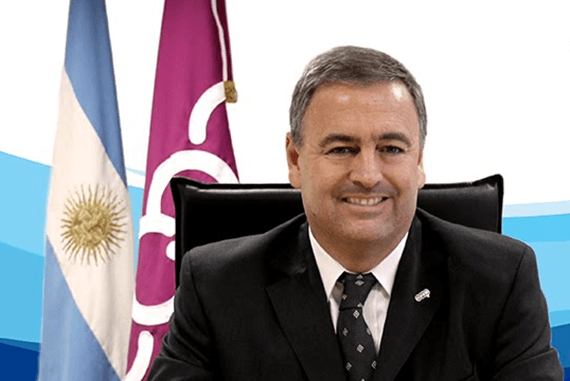
Visit Ariel Guarco's candidature website here
With the early retirement of Dame Pauline Green, the International Co-operative Alliance is hosting elections for the president position. Four candidates announced their intention to stand for election at the Alliance’s General Assembly in Antalya, Turkey. One of them is Ariel Guarco, president of Cooperar, the national apex organisation for co-operatives in Argentina. In an interview with Co-operative News, Mr Guarco shared his vision for the Alliance and the global co-operative movement.
“We are truly convinced that co-operation is a tool for social transformation,” he said, explaining why he decided to stand for election. “As the United Nations points out in its sustainable development agenda, inequalities have increased, and so have the intensity of natural disasters, conflicts and violent extremism. The world is waiting for a response to these threats. We think that co-operatives have the answer for building a better, more equitable and more inclusive society. This is what motivates us”, he added.
In Argentina Cooperar works with its 67 co-operative federations, 5,000 co-operatives and ten million members to achieve social transformation. The confederation has involved universities and grassroots co-operators in the process while also trying to influence decision making at the highest national level.
There is a lot to learn from the Argentinian experience, thinks Mr Guarco. In 2002 the country found itself in a severe economic crisis, with half of its population struggling to maintain employment and more than 25% living in poverty. “With over 100 years of history, co-operatives were able to use their experience and resources and help the most affected. Our public services co-operatives, which provide electricity, sanitation, Internet and other services are present in 1,100 cities, almost half of the country’s total number. They continued to provide these crucial services even when people could not pay, and developed a mechanism to provide health, educational, cultural and funeral services,” added Ariel Guarco. He explained how co-ops had also helped in the country’s reconstruction by providing a mechanism for workers to take control of bankrupt enterprises, generating thousands of jobs.
Following pressure from Cooperar, a new law was passed in 2009 that enabled co-operatives to own communication channels. Today Argentinian co-operatives own 450 television channels, 300 newspapers and 300 radio stations. “We have contributed to the process of democratising speech,” he said.
Referring to his main priorities as potential President of the Alliance, Mr Guarco says he would focus on ensuring a better representation of members by placing a stronger emphasis on relationships with co-operatives in different countries at grassroots level . This can be ensured by working closely with the Alliance’s regional and sectoral offices, he says. Another priority for him would be to find new ways of financing the Alliance, which is currently funded via membership fees. “To achieve this we need a political body like the board of the Alliance that is active, dynamic and interactive, working closely with those that implement these policies, with the Alliance’s staff members,” he says.
Argentina used to have three co-operative federations but the number has now increased to 77. “This is the result of Cooperar’s constant work,” added Mr Guarco. He thinks that when co-operatives see the difference being part of a representative body makes, they want to join it.
As well as creating a global identity for the movement, the Alliance has been able to represent the movement on the B20 group. Mr Guarco has taken part in the B20 meetings, joining other delegates on the Trade working group. “We have worked on setting out the agenda, but we do not carry that much weight. Our impact is still limited.” He would like to see trade restrictions removed, particularly for states that face trade barriers, which impact on all their co-operative sectors.
The UN’s post-2015 development agenda is also an important area of work for the Alliance. Mr Guarco thinks the 27 points mentioned on the agenda proposed at the Sustainability Summit are a “daily currency” for the co-operative movement, which focuses on local development, generating decent employment and producing in a sustainable way. An example could be public service co-operatives, which provide services to seven million people in Argentina, says Ariel Guarco.
He first got involved in the co-operative movement by holding different positions in his local electric co-operative. Mr Guarco has been the president of Cooperar since 2001 and a member of the Alliance’s board since 2013. He also presides over the Buenos Aires Electric Cooperative Federation. Sustainable development is just one potential common objective for the UN and the Alliance, says Mr Guarco. This can be an opportunity to work on achieving similar goals. He explains how following Pope Francis’ meeting with representatives from the Alliance and Cooperar in 2013, a number of Argentinian youth and Christian organisations and churches have started choosing co-operatives as service providers. “There are great opportunities to work together”, he concluded.




